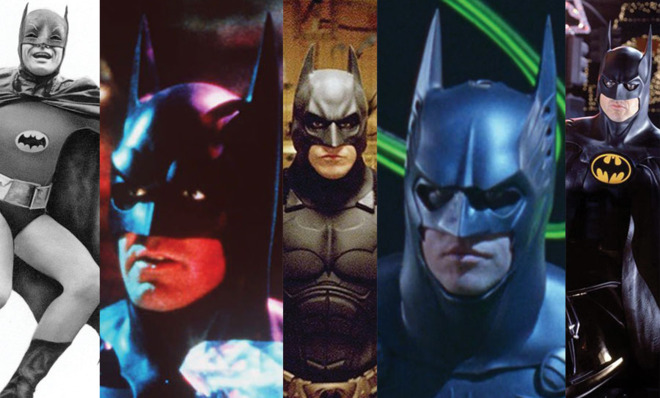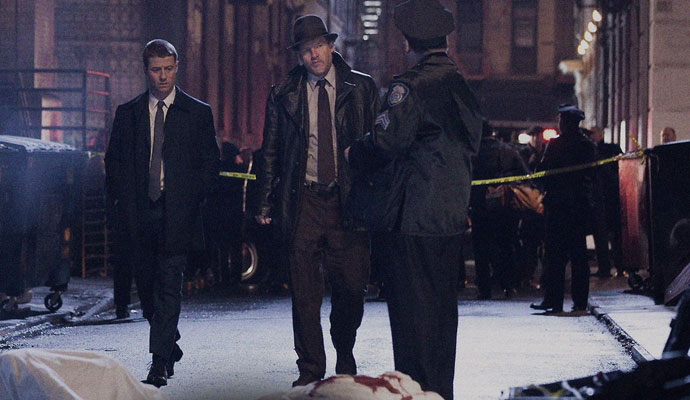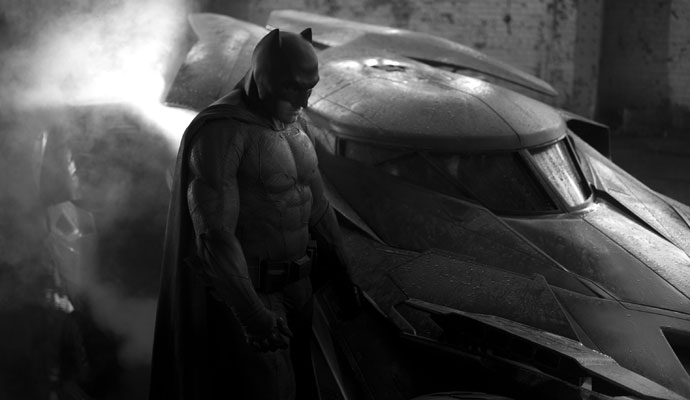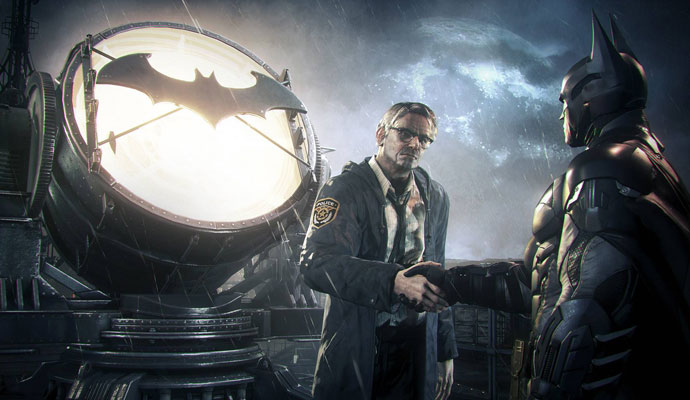Batman v. Superman, Gotham, and Arkham Knight: What kind of Batman do audiences really want?
The end of Christopher Nolan's character-defining Dark Knight trilogy has led to a scramble for the next great take on the superhero


A free daily email with the biggest news stories of the day – and the best features from TheWeek.com
You are now subscribed
Your newsletter sign-up was successful
In 2008, Neil Gaiman received an unusual offer from DC Comics: the chance to write the "last" Batman tale. The resulting story, Whatever Happened to the Caped Crusader?, takes place after Batman's death, at his wake, with allies like Robin and villains like the Joker putting aside their differences to share their memories of the superhero's greatest exploits.
Whatever Happened to the Caped Crusader? offered a loving tribute to the character's 70-year history — but of course, DC Comics never really intended to let Batman go gentle into that good night. As the story ends, Bruce Wayne is reborn, beginning the cycle all over again: a rich boy responds to the trauma of his parents' murder by donning a costume to fight the villains who threaten to destroy Gotham City.
Batman's death didn't even slow DC down; five years have passed since Gaiman's "last" Batman story hit shelves, and the company now publishes more than a dozen Batman series. Some characters are simply too rich to be killed.
The Week
Escape your echo chamber. Get the facts behind the news, plus analysis from multiple perspectives.

Sign up for The Week's Free Newsletters
From our morning news briefing to a weekly Good News Newsletter, get the best of The Week delivered directly to your inbox.
From our morning news briefing to a weekly Good News Newsletter, get the best of The Week delivered directly to your inbox.
But while the comic-book industry has a long history of killing and resurrecting beloved heroes — Superman, Wolverine, and Archie, to name just a few — Hollywood has traditionally been more skittish about messing around with prime real estate. And Christopher Nolan's enormously popular Dark Knight trilogy, which grossed nearly $2.5 billion worldwide, ended with a kind of death for Batman, allowing him to slip quietly into happy retirement, secure in the knowledge that Gotham City was finally safe.
Over the years, movie audiences have seen Adam West, Michael Keaton, Val Kilmer, and George Clooney don the cape and cowl, and the character's popularity always seemed to eclipse any feelings about the actor who plays him. But the retirement of the Dark Knight trilogy's Christian Bale is something different. This is the first time we've seen the entertainment industry grappling with the problem of reintroducing a superhero after a seemingly definitive take ends.
How do you convince mainstream audiences they need another Batman story? Over the next two years, mainstream audiences will be treated to three new, disparate riffs on the Dark Knight: Fox's new TV series Gotham, the Man of Steel sequel Batman v. Superman, and the video game Batman: Arkham Knight.
Gotham
A free daily email with the biggest news stories of the day – and the best features from TheWeek.com

Gotham’s approach to the problems posed by the Dark Knight trilogy is a risky but simple one: Tell a Batman story without Batman in it. The series, which premiered this week to 8 million viewers, is set shortly after the murder of Bruce Wayne’s parents, following future Commissioner James Gordon (Ben McKenzie) as he rises through the Gotham Police Department when Wayne is still an adolescent.
What's different: Moving past Batman's origin story to show the origins of the Rogues Gallery. The approach might seem counterintuitive, but it makes a certain kind of warped sense. Frankly, Batman is one of the less interesting characters in the Batman universe. Several of the Dark Knight's most prominent villains — including the Penguin, the Riddler, and Poison Ivy — turned up by the end of the first episode. Mr. Freeze, Harvey Dent, the Scarecrow, and pretty much everybody else in Batman-world is slated to show up at some point this year.
What's the same: The self-serious tone, which only lets up when Jada Pinkett Smith shows up to chew the scenery as mobster Fish Mooney. Bruce Wayne may be a kid, but Gotham is content to take most of its thematic cues from the Dark Knight trilogy, including its own version of an early, pivotal encounter between Bruce Wayne and James Gordon.
------------------------------------------------------
Batman v. Superman: Dawn of Justice

Anyone who's jonesing for a more Dark Knight–style Dark Knight is probably safest looking to Zack Snyder's Batman v. Superman: Dawn of Justice, which is executive-produced by Christopher Nolan. Ben Affleck will play a Batman who is "tired and weary and seasoned" after an extended career as a crime fighter.
What's different: Batman and Superman have been paired together for decades in the comics (and in a number of popular cartoons), but this is the first time the two heroes will cross paths on the big screen. Affleck swears his take on Batman won't be a mere retread of the Dark Knight trilogy. "Once [Zack Snyder] showed me the concept, and that it would be both different from the great movies that [Christopher Nolan] and [Christian Bale] made, but still in keeping with tradition, I was excited," said Affleck in an interview with Variety. "Doing something different and new is always tricky and part of the thrill and the risk is that initially it confounds expectations."
What's the same: It starts with the presence of screenwriter David S. Goyer, who received story credits on all three movies in the Dark Knight trilogy. Superman is a very different character than Batman, but Man of Steel was certainly cut in the Nolan mold, from the grim, gritty tone to the bombastic Hans Zimmer score. If anything, Man of Steel hewed too closely to Nolan's model, so let's hope Affleck is right about that "new and different" thing, since Batman v. Superman will set the tone for the rest of DC's superhero movies going forward.
------------------------------------------------------
Arkham Knight

Surprisingly, despite its success, Nolan's Dark Knight trilogy spawned just a single video game — an all-but-forgotten adaptation of Batman Begins. Fortunately, Batman: Arkham Asylum (and its several sequels) arrived to fill the gap. Though the Arkham games aren’t directly based on Nolan’s trilogy, they benefited from the association: Arkham Asylum came out in 2009, just a year after The Dark Knight hit theaters and three years before The Dark Knight Rises arrived. The latest installment, Arkham Knight, will allow players to control Batman as he fights a group of supervillains who have united in an attempt to kill him.
What's different: Arkham Knight is an intriguing blend of Batman's greatest hits. Though Nolan's movies are an obvious reference point, the Arkham series also draws extensively from the voice cast for Batman: The Animated Series, including Kevin Conroy (Batman), Mark Hamill (Joker), and Arleen Sorkin (Harley Quinn).
What's the same: The Arkham games may borrow from Batman: The Animated Series' voice cast, but the grimmer, more violent tone is pure Nolan. The emphasis on disarming enemies using precise, fear-based tactics allows players to wield the kind of power that helped revive interest in the superhero after Batman Begins. Arkham Knight will also include the ability to drive the Batmobile, which bears a conspicuous resemblance to the Dark Knight trilogy's Tumbler.
------------------------------------------------------
Batman's transition from the Dark Knight era may be a new challenge, but this cycle of reinvention is typical of the superhero genre — it just took Hollywood a while to catch up to it. It's the same impulse that led Sony to launch the Amazing Spider-Man franchise just five years after Spider-Man 3, and the engine driving Josh Trank's Fantastic Four reboot.
And there are early signs that, for Batman, the cycle has already begun. The past year did bring one clever cinematic reinvention of Batman in the form of Will Arnett, who offered a parodic riff on the character's grimness in The LEGO Movie. "DARKNESS! NO PARENTS! CONTINUED DARKNESS! THE OPPOSITE OF LIGHT!" he wails in "Batman's Song." It's a hopeful sign that, no matter how many variations come along, creators will never stop finding ways to bring new perspective to the Dark Knight.
Scott Meslow is the entertainment editor for TheWeek.com. He has written about film and television at publications including The Atlantic, POLITICO Magazine, and Vulture.
-
 Switzerland could vote to cap its population
Switzerland could vote to cap its populationUnder the Radar Swiss People’s Party proposes referendum on radical anti-immigration measure to limit residents to 10 million
-
 Political cartoons for February 15
Political cartoons for February 15Cartoons Sunday's political cartoons include political ventriloquism, Europe in the middle, and more
-
 The broken water companies failing England and Wales
The broken water companies failing England and WalesExplainer With rising bills, deteriorating river health and a lack of investment, regulators face an uphill battle to stabilise the industry
